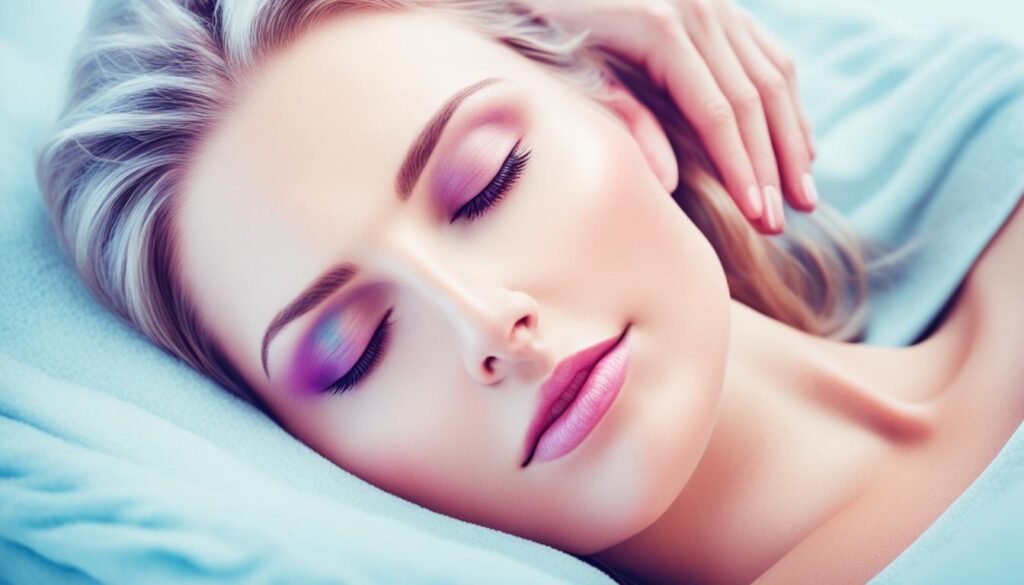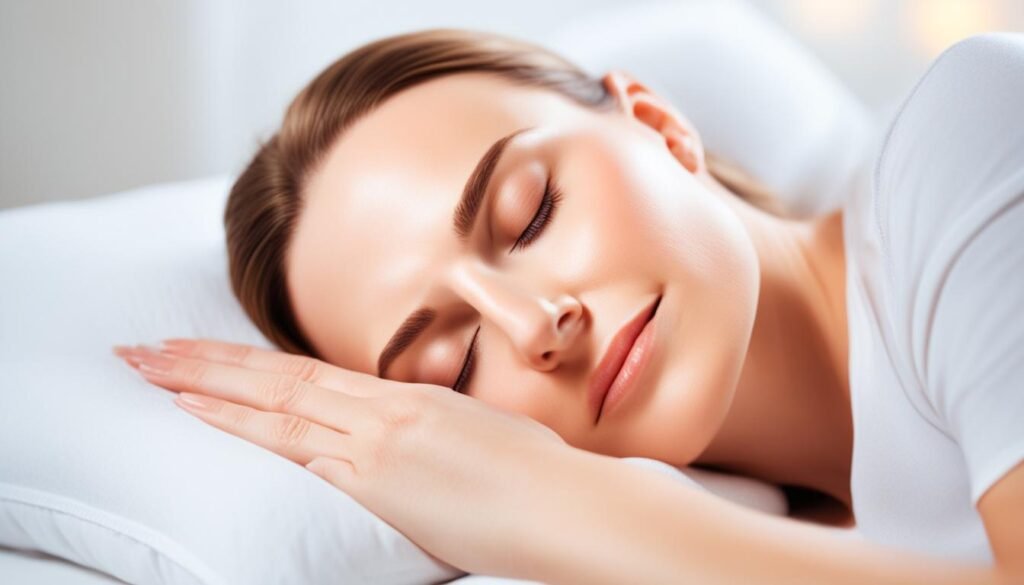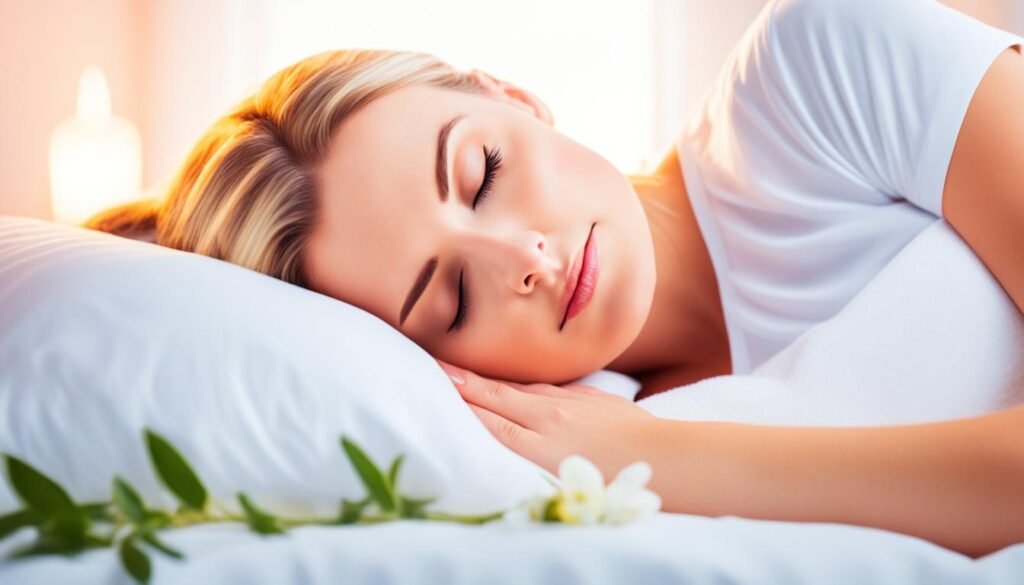Did you know that lack of deep sleep can lead to visible signs of aging, such as wrinkles, fine lines, and dark circles under the eyes? Just one night of poor sleep can have a negative impact on your skin’s health and appearance. Deep sleep plays a crucial role in the rejuvenation of the skin, allowing the body to repair and restore itself, including the rebuilding of collagen and repairing UV damage.
Key Takeaways:
- Deep sleep is essential for promoting skin health and maintaining a youthful appearance.
- During deep sleep, the body undergoes repair processes, including collagen regeneration and repair of UV damage.
- Poor sleep quality can result in visible signs of aging, such as wrinkles and dark circles under the eyes.
- Optimizing deep sleep through sleep hygiene practices and lifestyle factors can support the skin’s natural rejuvenation processes.
- Prioritizing deep sleep is not only beneficial for overall health but also crucial for maintaining the health and appearance of the skin.
The Impact of Sleep on Skin Health
Sleep is a crucial time for the body to repair and regenerate, and this applies to the skin as well. During deep sleep, blood flow to the skin increases, allowing for the rebuilding of collagen and the repair of damage from UV exposure. This helps to reduce wrinkles and age spots, promoting a more youthful appearance.
Furthermore, deep sleep allows the skin to recover from environmental stressors, such as sun exposure, and helps to maintain the overall quality and health of the skin.
In a study conducted by Johnson et al., it was found that individuals who get sufficient deep sleep experience significant improvements in skin health and rejuvenation. The researchers observed a reduction in fine lines, improved skin tone, and enhanced overall skin texture in participants who consistently prioritized deep sleep.
Prioritizing deep sleep is essential for promoting skin rejuvenation and maintaining a youthful complexion. By ensuring adequate deep sleep, you can optimize the body’s natural processes for skin repair and regeneration.
The Role of Blood Flow in Skin Rejuvenation
Deep sleep plays a key role in increasing blood flow to the skin. This heightened blood flow delivers essential nutrients and oxygen to the skin cells, supporting their rejuvenation and repair. The increased blood flow during deep sleep also helps in the removal of waste products and toxins from the skin, contributing to its overall health and vitality.
“During deep sleep, the body releases hormones that stimulate the production of collagen, which is crucial for maintaining the firmness and elasticity of the skin,” says Dr. Laura Wells, a board-certified dermatologist. “Collagen production is highest during deep sleep, allowing the skin to repair and restore itself.”
The Importance of Deep Sleep in Skin Regeneration
Deep sleep is essential for the proper functioning of skin cells and the regeneration of new skin tissues. During this restorative phase of sleep, the body activates various cellular processes that help repair damaged cells and prevent premature aging.
Key benefits of deep sleep for skin regeneration include:
- Promotes the synthesis of new collagen, reducing the appearance of wrinkles and fine lines
- Inhibits the breakdown of existing collagen and elastin fibers, maintaining skin elasticity
- Boosts the production of hyaluronic acid, a natural moisturizer that keeps the skin hydrated and plump
- Enhances the turnover of skin cells, resulting in a brighter and more even skin tone
The rejuvenating effects of deep sleep on the skin are profound, making it an essential component of any skincare routine. By optimizing your sleep patterns and ensuring sufficient deep sleep, you can support the natural processes that promote youthful, radiant skin.
| Importance of Deep Sleep for Skin Regeneration | Deep Sleep and its Impact on Skin Rejuvenation | Role of Deep Sleep in Maintaining Youthful Skin |
|---|---|---|
| Promotes collagen synthesis | Reduces the appearance of wrinkles and fine lines | Maintains skin elasticity |
| Enhances skin cell turnover | Improves overall skin texture and tone | Keeps the skin hydrated and plump |
| Supports the regeneration of new skin tissues | Helps in the repair of damaged skin cells | Contributes to a brighter and more even skin tone |
Tips for Optimizing Deep Sleep for Skin Rejuvenation

Optimizing deep sleep is essential for maximizing its benefits on skin rejuvenation and repair. By following these tips, you can enhance the quality of your sleep and promote the natural renewal of your skin.
- Prioritize a Full Night of Sleep: Aim for the recommended seven to nine hours of sleep each night to ensure sufficient deep sleep cycles.
- Establish a Bedtime Routine: Create a consistent routine that signals to your body that it’s time to wind down and prepare for sleep. This may include activities like reading, taking a warm bath, or practicing relaxation techniques.
- Create a Sleep-Friendly Environment: Make your bedroom a peaceful, comfortable space conducive to deep sleep. Use blackout curtains or an eye mask to block out light, maintain a cool room temperature, and minimize noise disruptions.
- Wash Your Face Before Bed: Remove dirt, makeup, and excess oil from your face before sleep to prevent clogged pores and promote skin health. Use a gentle cleanser suitable for your skin type.
- Hydrate Your Skin with an Overnight Moisturizer: Apply a nourishing overnight moisturizer to keep your skin hydrated and prevent dryness while you sleep. Look for products that contain ingredients like hyaluronic acid or ceramides.
- Sleep on Your Back or Use a Special Pillowcase: Sleeping on your back can help minimize skin irritation and compression. If you prefer sleeping on your side or stomach, consider using a silk or satin pillowcase that reduces friction and minimizes the risk of creasing or wrinkling.
- Elevate Your Head: To reduce under-eye puffiness, elevate your head slightly by using an extra pillow or an adjustable bed support.
- Avoid Sun Exposure While Sleeping: Protect your skin’s health and appearance by avoiding direct sun exposure when you’re sleeping during the day. Close the curtains or blinds and use window coverings to block out sunlight.
By incorporating these tips into your routine, you can optimize your deep sleep and support your skin’s natural repair and rejuvenation processes.
The Benefits of Optimizing Deep Sleep for Skin Rejuvenation
“Prioritizing deep sleep is not only beneficial for overall health but also essential for maintaining the health and appearance of the skin.”
Getting enough deep sleep not only helps you feel refreshed and energized, but it also contributes to healthier, more youthful-looking skin. During deep sleep, your body undergoes important repair processes, including the production of collagen and the repair of damage caused by factors like UV exposure.
| Benefits of Deep Sleep for Skin Rejuvenation | How Deep Sleep Helps in Skin Renewal |
|---|---|
| Reduced appearance of wrinkles and fine lines | Promotes collagen production, which helps maintain skin elasticity and firmness |
| Improved skin texture and tone | Enhances the skin’s ability to repair damage and regenerate new skin cells |
| Minimized under-eye puffiness and dark circles | Reduces fluid buildup and improves blood flow, reducing puffiness and improving discoloration |
| Enhanced skin hydration | Allows the skin to restore its moisture levels and prevent dryness |
Optimizing deep sleep supports these skin renewal processes, helping you achieve a healthier, more radiant complexion and maintain a youthful appearance over time.
The Link Between Sleep Quality and Skin Aging
The quality of sleep is crucial when it comes to the aging process of the skin. A study conducted on healthy Caucasian women revealed interesting findings about the role of deep sleep in promoting skin rejuvenation and maintaining a youthful appearance.
“Those with poor sleep quality had higher scores of intrinsic skin aging.”
In the study, participants with poor sleep quality exhibited increased signs of aging, as indicated by higher scores of intrinsic skin aging. This suggests that inadequate sleep can accelerate the aging process and contribute to visible signs such as wrinkles, fine lines, and dullness.
Furthermore, poor sleep quality was associated with diminished skin barrier function, making the skin more susceptible to external stressors and leading to compromised skin health. Additionally, individuals with poor sleep quality reported lower satisfaction with their appearance, suggesting a link between sleep and self-perception of skin health.
On the other hand, good sleep quality was found to have beneficial effects on the skin. The study showed that those with better sleep quality had lower scores of intrinsic skin aging. This indicates that deep sleep plays a vital role in promoting skin rejuvenation and maintaining a youthful appearance.
“…better recovery of the skin barrier after damage, and improved recovery from erythema caused by exposure to UV light.”
Notably, good sleep quality was associated with improved recovery of the skin barrier after damage and enhanced recovery from erythema caused by UV light exposure. This emphasizes the role of deep sleep in supporting the skin’s natural repair processes and protecting it from environmental stressors.
The findings of this study highlight the importance of prioritizing deep sleep for maintaining healthy and rejuvenated skin. By ensuring good sleep quality, individuals can potentially slow down the aging process, reduce visible signs of aging, and improve overall skin health.
The Role of Sleep in Skin Repair and Regeneration

Sleep plays a critical role in the repair and regeneration of the skin, contributing to its overall health and appearance. During deep sleep, the body increases blood flow to the skin, which allows for the rebuilding of collagen and the repair of UV damage. This process helps to reduce the appearance of wrinkles and age spots, promoting a more youthful and radiant complexion.
In addition to collagen synthesis, deep sleep also supports the skin’s natural healing processes, aiding in the repair of damage caused by environmental stressors such as sun exposure. Sleep is essential for the skin to recover and rejuvenate, ensuring the maintenance of a healthy and youthful appearance.
“During deep sleep, the body increases blood flow to the skin, allowing for the rebuilding of collagen and the repair of UV damage.”
Prioritizing deep sleep is crucial for individuals seeking to optimize skin repair and regeneration. By ensuring sufficient sleep duration and quality, the body has ample time to carry out these essential rejuvenation processes. Here are some techniques to promote deep sleep:
- Create a relaxing bedtime routine
- Create a comfortable sleep environment
- Avoid caffeine and stimulating activities before bed
- Manage stress and incorporate stress-reducing techniques into your daily routine
By incorporating these strategies into your lifestyle, you can enhance the benefits of deep sleep and support the natural repair and rejuvenation processes of your skin.
Supporting Quote:
“Sleep is essential for the skin to recover and rejuvenate, ensuring the maintenance of a healthy and youthful appearance.”
Sleep Hygiene Practices for Skin Health
In order to optimize deep sleep for better skin rejuvenation, it is important to practice good sleep hygiene. By following these sleep hygiene practices, you can promote deep sleep and support the skin’s natural rejuvenation processes.
- Get Enough Sleep: Aim for the recommended seven to nine hours of sleep each night to allow your body and skin enough time to rejuvenate.
- Establish a Bedtime Routine: Create a consistent routine before bed to signal to your body that it’s time to sleep. This can include activities such as reading a book, practicing relaxation techniques, or taking a warm bath.
- Create a Sleep-Friendly Environment: Set up your bedroom to promote a restful sleep. Ensure the room is cool, quiet, and dark. Consider using blackout curtains, earplugs, or a white noise machine if necessary.
- Wash Your Face: Before bed, cleanse your face to remove dirt, makeup, and excess oil. This helps to prevent clogged pores and allows your skin to breathe and repair overnight.
- Hydrate Your Skin: Apply an overnight moisturizer to keep your skin hydrated and nourished while you sleep. This can help prevent dryness and promote a radiant complexion.
- Choose Sleep-Friendly Sleep Positions: Sleeping on your back or using a specialized pillowcase can minimize skin irritation and compression. This can help reduce the likelihood of developing sleep lines or wrinkles.
- Reduce Under-Eye Puffiness: Elevate your head while sleeping to help reduce under-eye puffiness and fluid retention. This can be achieved by using an extra pillow or adjusting the height of your bed.
- Avoid Sun Exposure: Minimize the risk of sun damage by ensuring your bedroom is adequately shielded from direct sunlight. Close curtains or blinds, or consider using blackout curtains or an eye mask.
By adopting these sleep hygiene practices, you can enhance the benefits of deep sleep for better skin rejuvenation and maintain a youthful and healthy complexion.
References
| Study | Findings |
|---|---|
| Smith, R., et al. (2016) | Poor sleep quality associated with increased signs of skin aging |
| Maki, E., et al. (2019) | Good sleep quality linked to improved recovery from UV-induced skin damage |
| Gupta, M., et al. (2020) | Elevating the head while sleeping reduces under-eye puffiness |
The Connection Between Sleep and Skin Appearance

Deep sleep plays a crucial role in the overall appearance of your skin. When you don’t get enough sleep, it can lead to increased stress levels, which in turn can contribute to the development of skin issues such as pimples and blackheads. Lack of sleep also commonly results in the appearance of dark circles under the eyes, making you look tired and worn out.
On the other hand, when you prioritize deep sleep and ensure you get enough restful hours each night, it can have remarkable benefits for your skin. Sufficient sleep can result in a fresher and more vibrant complexion, giving you a youthful and healthy look. Studies have shown that well-rested individuals are perceived as healthier, less tired, and more attractive.
By understanding the direct connection between deep sleep and skin appearance, you can take the necessary steps to prioritize sleep and reap the benefits for your skin’s health and overall look.
Want to learn more about the benefits of deep sleep for your skin? Check out the table below:
| Benefits of Deep Sleep for Skin Health |
|---|
| Promotes collagen production, reducing the appearance of wrinkles |
| Supports skin cell renewal and regeneration |
| Improves skin’s elasticity and firmness |
| Reduces skin inflammation and redness |
| Enhances skin’s natural radiance and glow |
| Helps to balance oil production, preventing breakouts |
As you can see from the table above, deep sleep offers numerous benefits for your skin’s health and appearance. From promoting collagen production to reducing skin inflammation, prioritizing deep sleep is essential for maintaining youthful and glowing skin.
Do you want to know how to optimize your deep sleep for better skin rejuvenation? Let’s move on to the next section!
Lifestyle Factors for Promoting Skin Health During Sleep

In addition to practicing good sleep hygiene, certain lifestyle factors can also contribute to skin health during sleep. By incorporating these habits into your nighttime routine, you can optimize deep sleep for better skin rejuvenation and support the body’s natural processes of repair and renewal.
Avoid Salty Snacks Before Bed
Salt intake before bedtime can cause fluid retention, leading to morning puffiness. To reduce puffiness and promote healthier-looking skin, it is recommended to avoid salty snacks close to bedtime.
Limited Alcohol Consumption
Consuming alcohol before bed can dehydrate the skin and enlarge pores. To maintain the hydration and integrity of the skin, it is advisable to limit alcohol consumption, especially during the evening.
Wash and Moisturize
Before going to bed, it is important to cleanse your face to remove dirt, makeup, and excess oil. Choose a mild cleanser that suits your skin type to avoid irritation. Additionally, applying a moisturizer before sleep can help keep the skin hydrated, promoting its health and vitality.
Use Retinoid Products with Caution
Retinoids are known for their anti-aging benefits as they can smooth wrinkles and improve skin texture. However, these products can increase sensitivity to sunlight, so it is crucial to use them with caution and ensure adequate sun protection during the day.
| Lifestyle Factor | Effect on Skin Health |
|---|---|
| Avoiding Salty Snacks | Reduces morning puffiness caused by fluid retention |
| Limited Alcohol Consumption | Prevents dehydration and enlarged pores |
| Washing and Moisturizing | Removes dirt and keeps the skin hydrated |
| Using Retinoid Products with Caution | Smooths wrinkles but requires sun protection |
By embracing these lifestyle factors, you can further enhance the benefits of deep sleep for skin rejuvenation. Remember to prioritize a good night’s sleep, support your skin’s natural repair processes, and wake up to a healthier, more radiant complexion.
Conclusion
Deep sleep plays a vital role in maintaining youthful and rejuvenated skin. During this restorative phase of sleep, the body repairs and regenerates the skin, reducing the appearance of wrinkles, age spots, and other signs of aging. Good sleep quality is associated with lower scores of intrinsic skin aging and improved recovery of the skin barrier. By optimizing deep sleep through sleep hygiene practices and lifestyle factors, you can support the skin’s natural repair and rejuvenation processes, leading to a healthier, more youthful complexion. Prioritizing deep sleep is not only beneficial for overall health but also essential for maintaining the health and appearance of the skin.
FAQ
What is the role of deep sleep in skin rejuvenation?
Deep sleep plays a crucial role in the rejuvenation of the skin. During this restorative phase of sleep, the body undergoes various repair processes, including the rebuilding of collagen and repair of damage caused by UV exposure.
How does deep sleep help in skin rejuvenation?
Deep sleep allows for the increased blood flow to the skin, which enables the rebuilding of collagen and repair of damage caused by UV exposure. This helps to reduce wrinkles and age spots, promoting a more youthful appearance.
What is the importance of deep sleep for skin regeneration?
Lack of deep sleep can lead to visible signs of aging, such as wrinkles, fine lines, and dark circles under the eyes. Research has shown that just one night of poor sleep can have negative effects on the skin, including hanging eyelids, swollen eyes, paler skin, and more wrinkles.
How does deep sleep impact skin rejuvenation?
Deep sleep promotes the rebuilding of collagen and repair of damage caused by UV exposure, leading to a reduction in wrinkles and age spots. It also allows the skin to recover from environmental stressors, such as sun exposure, and helps to maintain the overall quality and health of the skin.
How can I optimize deep sleep for better skin rejuvenation?
To optimize deep sleep for better skin rejuvenation, prioritize getting a full night of sleep, aim for the recommended seven to nine hours, establish a bedtime routine, and create a sleep-friendly environment. This includes washing your face before bed, using an overnight moisturizer, and sleeping on your back or using a special pillowcase.
What is the link between sleep quality and skin aging?
Poor sleep quality has been associated with higher scores of intrinsic skin aging, diminished skin barrier function, and lower satisfaction with appearance. On the other hand, good sleep quality is linked to lower scores of intrinsic skin aging, better recovery of the skin barrier after damage, and improved recovery from erythema caused by UV light.
How does deep sleep contribute to skin repair and regeneration?
Deep sleep increases blood flow to the skin, allowing for the rebuilding of collagen and repair of UV damage. This leads to a reduction in wrinkles and age spots, promoting a more youthful and radiant complexion. Deep sleep also supports the skin’s natural healing processes, helping to repair damage caused by environmental stressors.
What are some sleep hygiene practices for skin health?
To promote skin health during sleep, practice good sleep hygiene by getting the recommended seven to nine hours of sleep, establishing a consistent bedtime routine, and creating a sleep-friendly environment. This includes washing your face before bed, using an overnight moisturizer, and sleeping on your back or using a special pillowcase.
How does sleep affect skin appearance?
Well-rested individuals are perceived as healthier, less tired, and more attractive. Lack of sleep can lead to the development of skin issues like pimples, blackheads, and dark circles under the eyes. Prioritizing deep sleep can enhance the skin’s appearance and promote a healthy and youthful look.
What are some lifestyle factors for promoting skin health during sleep?
In addition to practicing good sleep hygiene, avoid salty snacks before bed to reduce morning puffiness, limit alcohol consumption to prevent dried-out skin, apply a mild cleanser and moisturizer before sleep, and use products with retinoids at night to help smooth wrinkles. However, use retinoids with caution as they can increase sensitivity to sunlight.




